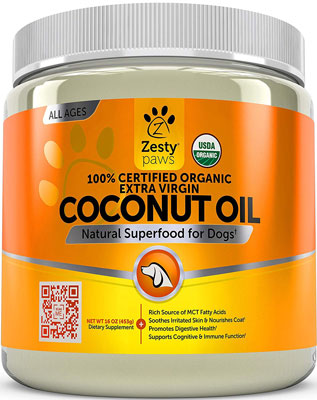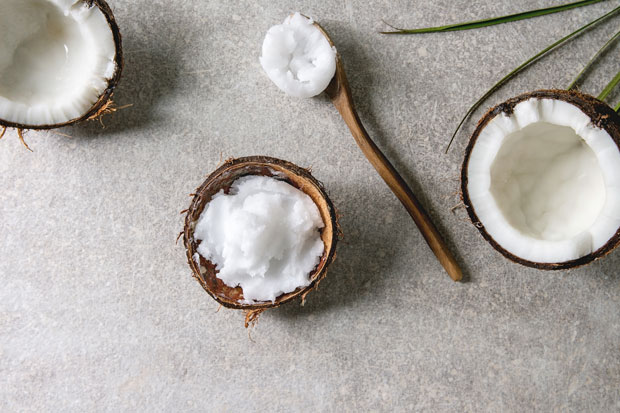Health
Key Benefits of Coconut Oil for Dogs

What is Coconut Oil?
Coconut oil, also known as copra oil is edible oil extracted from the kernel or meat of mature coconuts. It has various uses; because of its high saturated fat content it is slow to oxide, thus resistant to spoiling; lasting up to six months at 75 degrees Fahrenheit.
Virgin coconut oil can be produced from fresh coconut milk, meat or residue. You can use a screw press or wet-mill to extract the oil. Virgin Coconut oil can also be extracted from meat by grating and drying it to a moisture content of approximately 10%. There are several other methods of producing coconut oil that can be found by a simple internet search.
Magical Super Food or Empty Promises?
I have seen my share of health conscience friends slather both themselves and their dog in some form of coconut oil; frequently adding to their pets food (indiscriminately might I add).
I assumed these gluten free, wheat free new agers had done their research; perhaps they had – however, much research still needs to be done and many blogs and posts I found to be lacking in any scientific sources or studies.
Simple speculation; some of the statements on benefits of coconut oil appear to be inferences made that at times are logical, yet still not backed up by hard evidence. This proof is not limited to dogs but humans also.
Many reading this may be, or consider themselves to be coconut aficionados; by no means have you erred in going the way of the coconut.
There are some important guidelines that should be followed when treating or feeding your dog coconut oil; you may also not want to give something credit where it is not due (at least not yet). I encourage everyone to do their own research, as this is an ever changing field, and most likely much more research will be done on such matters.
Test If Your Dog is Allergic
The coconut, in any shape or form is non-toxic; as it has a shell you shouldn’t need to worry about pesticides, though one can never be too sure. It is recommended only using organic cold-pressed virgin coconut oil. Though coconut oil is non-toxic this does not mean that your dog cannot be allergic to it, just like any other product.
Now if your dog has already tried it, and is fine then you need not worry; if you are considering starting your dog on some type of coconut oil regime you may want to take your canine companion to the veterinarian to get an allergy test.
If this sounds pricey, I have found that Groupon, (money saving app) is a good source for a deal; this will run you about $70 give or take, and is of great benefit for your dog for all kinds of ailments that come from random allergies. If you have pet insurance, you could also check to see if you get reimbursed for such tests.
Should I Give My Dog Coconut Oil if They’re Overweight?
Moving on, we next want to access whether our beloved pooches are overweight. The importance of this stems from the calorie content in coconut oil. Even if you plan on solely using coconut oil as a topical treatment, your dog may like it immensely and proceed to lick it off, so you may not want to slather Fido in it just yet.
If you are not sure about your dogs body mass ratio you can also ask your vet, or there are some very helpful charts and diagrams online and in dog books that are breed specific, which can aid you in such matters. You will also want to take into consideration your dog’s age, whether he/she is pregnant or lactating.
The Size of Your Dog
Additionally, whether you have a large breed or small breed will be significant in regard to how much coconut oil to give your furry friend. According to Healthline, researchers at the BBC and PetMd, labeling coconut oil as a “super food” may be a tad premature.
This could be due to a well thought out marketing plan, or simply a jump of the gun due to some over enthusiasm. Melissa Majumdad, RD a senior bariatric dietitian at Brigham Young Center for Metabolic and Bariatric Surgery, as well as a spokesperson for the Academy of Nutrition and Dietetics told Healthline that coconut oil is not poison, but according to Majumdar, “people may not be aware that medium-chain triglycerides only make up about 14 percent of coconut oil. The rest are long-chain triglycerides — the ones that can cause heart disease”.
Other studies have tried to answer this ongoing public debate about the benefits of coconut oil, but so far, research hasn’t provided a clear answer.
In 2016 a trusted source did a meta- analysis of coconut oil research and published in Nutrition Reviews looking at 21 studies. The report said there aren’t enough well-designed studies yet for any real meaningful conclusions to be determined. Majumdad said “despite inconclusive evidence, the health benefits of coconut oil continue to linger in the public’s collective mind”.
A New York Times survey showed that 72 percent of the public view coconut oil as healthy, compared to just 37 percent of nutritionists.
Majumdar told Healthline that coconut oil isn’t poison, but it also doesn’t deserve super food status either. “I don’t like to call food good or bad, let alone poison,” she said, “but coconut oil is not the saving grace that we think it is.”Coconut oil is derived from the white flesh of the tropical fruit.
Coconut oil is high in saturated fats, about 80 percent. Red meat contains 50 percent saturated fat, while butter holds about 65 percent of saturated fat. Studies have shown that consuming too much saturated fats can cause to rise in the blood stream. This is the bad fats that can ultimate lead to hypertension, cardiovascular disease, and heart disease.
Benefits of Coconut Oil For Dogs
Coconut oil is slated to make your dogs coat shinier and clear up skin irritation. The coconut, being high in vitamin C, keeps a dogs coat moisturized and glossy, I must note that dogs do produce Vitamin C inside their own bodies. There are also plenty of healthy alternatives to coconut if your dog is allergic.
Coconut Oil Can Be Used to Fight Dog Diseases
Coconut oil is said to aid in the treatment of Canine Cognitive Dysfunction, AKA CCD, (comparable to Alzheimer’s in humans). This disorder is characterized by altered behavior, anxiety, lapses in house-training and restless/altered sleeping patterns.
The theory behind coconut oil according to U.C. San Diego’s Dr Rafii, Director of Memory Disorders Clinic, is the knowledge that coconut oil has medium chain triglycerides, which are a good source of energy in the form of ketones.
Furthermore, in the body, MCT’s are converted in the liver into ketones; they can then be used by the brain as fuel; thus being a more immediate source of energy than other fats. The theory (though no known study supports this currently), is that in Alzheimer’s, ketones may provide alternative energy sources for brain cells that have lost their ability to use glucose as a result of Alzheimer’s pathology.
Can Coconut Oil Treat Worms?
Coconut Oil has been suggested as a non-toxic, all natural treatment for intestinal worms. I did not find a lot of hard science and the effectiveness of CO as an anti parasitic or anti-fungal; however, as coconut is rich in fiber and digestive oils, it has been found to be helpful in the removal of worm eggs from a dogs system.
How to use: You would want to use dried, unsweetened coconut oil or meat for this. Coconut flour provides about 35% of dietary fiber; this lowers cholesterol levels and can improve digestion. Flour is non-allergenic (does not cause allergic reaction), gluten free, wheat free, and is said to help with urinary tract infections, stomach ulcers and tooth cavities.
There are also studies from India and the Philippines, which have lent some credibility in using coconut oil for wound healing. Although no studies showing it can help with allergic dermatitis have been done to my knowledge.
Use Coconut Oil for Fleas and Bites

Coconut oil is said to be a flea repellant and there is some promising evidence to back this up. A study in 2004 in Brazil, states that coconut oil based remedies are effective in some ways; repelling sand fleas and reducing inflammation left by bites.
In 2013 a study set in the Philippines found coconut oil plays a significant role in treating mange and scabies. No trials have been carried out at this time in relation the itchy cat flea (most common dog flea). It is emphasized that CO has been found to repel rather than kill fleas.
Directions for Use: You can give your dog coconut oil 1 to 2 times per day with meals. The quantity depends on the size. Vets typically state to start slow on this regime. Too much coconut oil will cause your pet to have diarrhea.
For small dogs: up to ¼ of a tablespoon and large dogs up to 1 tablespoon. If your dog is obese you should definitely consult your vet and give coconut oil no more than once a day, due to the high fat content. You can use coconut oil as a base for dog treats; making these from scratch at home, or purchasing some at a pet store. You will want to make sure it is virgin and cold pressed coconut oil in the ingredients and that nothing extra has been added.
Turmeric and Vitamin D rich foods are also very beneficial for your dog, and are considered anti-inflammatory (be careful not to over supplement, as this can cause kidney problems). Do not give to dogs prone to pancreatitis. Ensure no sugar or chemicals are added. You can alternatively feed your dog coconut chunks or chips.
Coconut oil can be used as a coating on pills to help dogs swallow them. You can also rub a small amount on your hands and gently pat your dogs coat and massage a little down on the skin; this can help prevent skin flaking and dryness.
The application of coconut oil is best right after you have bathed your dog. You can rub it all over your dog, allow the CO to sit for 10 minutes, then rinse your dog off. First rinse your dog with water, then with shampoo; ensuring the coat is no longer greasy. You can also add coconut oil to shampoo; as the chemical properties allow for easier penetration of hair strands and better absorption of nutrients through skin to help improve a dogs coat and skin.
Coconut Oil for Paw Care

During the winter season your pooches’ paws may become dry and cracked. You can apply coconut oil to the bottoms of the pads to help protect and sooth them.
There is also the belief that coconut oil possesses anti fungal and anti yeast properties, though this has not been fully investigated scientifically. The procedure to apply CO I mentioned previously applies to paws as well.
Findings: I still believe that “the tree of life” as the coconut tree has been named, does possess some helpful and beneficial elements. Some credence should be given to the age old saying “everything in moderation”. With any new fad, we all need to be responsible pet owners and consumers and do our own research. Just because something is organic and sold at the local co- op does not mean we should buy it. It seems we tend to be more trusting of products coming in glass jars that are “gluten free” ; appearing to be made at some all natural mom and pop farm.
We recommend trying out Zesty’s coconut oil for dogs, they have over 200+ 5 star reviews from dog owners and it is made from 100% Certified Organic coconuts.
Zesty Coconut Oil for Dogs

100% CERTIFIED ORGANIC - Zesty Paws Coconut Oil is a extra virgin superfood made from 100% Certified Organic coconuts that can be consumed for internal benefits or used on the skin to keep your pet feeling healthy and happy.
This is definitely a very successful marketing method, perhaps originally directed towards the diehard Whole Foods shoppers; I have definitely fallen victim to it myself. I do think any product that has been found to pose some benefits and is non toxic all across the board is worthy of some attention, and a plus if we can substitute it for something more harmful, with more preservatives.
I also think that there are some tried and true sources of protein coming from both plants and animals that are just as good if not better. We really need to think about why we are doing something, what is the true value of this on our dogs and on us for that matter?
Coconut oil appears to be harmless given at the directed amounts, and can aid in getting a picky dog to eat his or her biscuits, and possibly help their skin and fur.
I think the coconut debate really brings to light that we don’t often look on the back of a box or a can when it comes to our pets; we have associations through certain labeling and effective marketing campaigns. The coconut may not end up being all it’s cracked up to be, but it is still our fruity friend and a much more positive alternative to many out there.
Recommended: The Best Essential Oils for Dogs and How to Use Them
- Topics:
- Health




